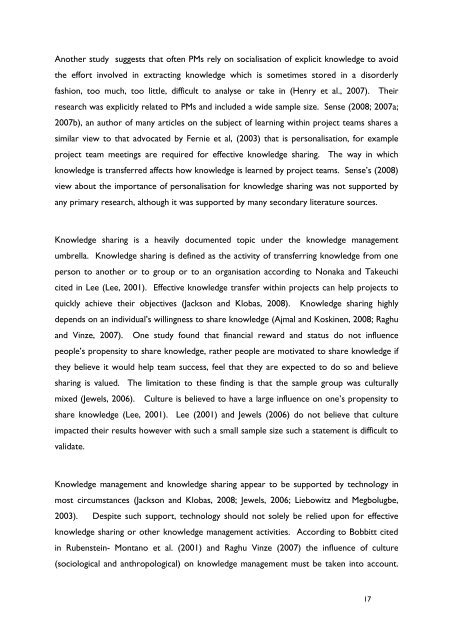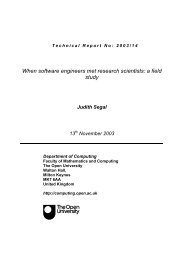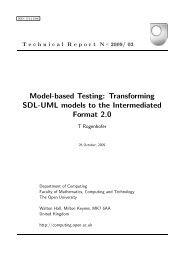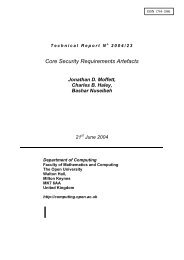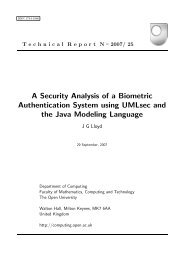Assembling The Project Compendium - Computing Technical ...
Assembling The Project Compendium - Computing Technical ...
Assembling The Project Compendium - Computing Technical ...
Create successful ePaper yourself
Turn your PDF publications into a flip-book with our unique Google optimized e-Paper software.
Another study suggests that often PMs rely on socialisation of explicit knowledge to avoid<br />
the effort involved in extracting knowledge which is sometimes stored in a disorderly<br />
fashion, too much, too little, difficult to analyse or take in (Henry et al., 2007). <strong>The</strong>ir<br />
research was explicitly related to PMs and included a wide sample size. Sense (2008; 2007a;<br />
2007b), an author of many articles on the subject of learning within project teams shares a<br />
similar view to that advocated by Fernie et al, (2003) that is personalisation, for example<br />
project team meetings are required for effective knowledge sharing. <strong>The</strong> way in which<br />
knowledge is transferred affects how knowledge is learned by project teams. Sense‟s (2008)<br />
view about the importance of personalisation for knowledge sharing was not supported by<br />
any primary research, although it was supported by many secondary literature sources.<br />
Knowledge sharing is a heavily documented topic under the knowledge management<br />
umbrella. Knowledge sharing is defined as the activity of transferring knowledge from one<br />
person to another or to group or to an organisation according to Nonaka and Takeuchi<br />
cited in Lee (Lee, 2001). Effective knowledge transfer within projects can help projects to<br />
quickly achieve their objectives (Jackson and Klobas, 2008). Knowledge sharing highly<br />
depends on an individual‟s willingness to share knowledge (Ajmal and Koskinen, 2008; Raghu<br />
and Vinze, 2007). One study found that financial reward and status do not influence<br />
people‟s propensity to share knowledge, rather people are motivated to share knowledge if<br />
they believe it would help team success, feel that they are expected to do so and believe<br />
sharing is valued. <strong>The</strong> limitation to these finding is that the sample group was culturally<br />
mixed (Jewels, 2006). Culture is believed to have a large influence on one‟s propensity to<br />
share knowledge (Lee, 2001). Lee (2001) and Jewels (2006) do not believe that culture<br />
impacted their results however with such a small sample size such a statement is difficult to<br />
validate.<br />
Knowledge management and knowledge sharing appear to be supported by technology in<br />
most circumstances (Jackson and Klobas, 2008; Jewels, 2006; Liebowitz and Megbolugbe,<br />
2003). Despite such support, technology should not solely be relied upon for effective<br />
knowledge sharing or other knowledge management activities. According to Bobbitt cited<br />
in Rubenstein- Montano et al. (2001) and Raghu Vinze (2007) the influence of culture<br />
(sociological and anthropological) on knowledge management must be taken into account.<br />
17


